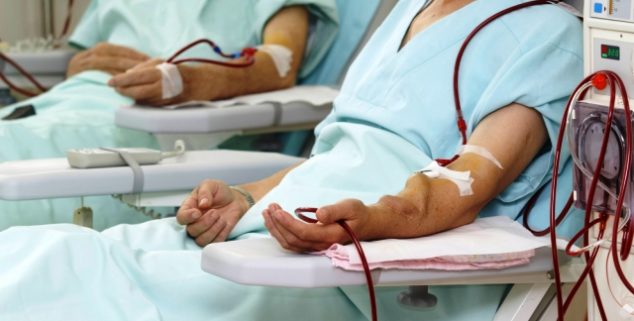Opinion
A case for charitable health care
 A hospital patient is monitored during a dialysis session. (Photo: PicsFive, via Shutterstock)
A hospital patient is monitored during a dialysis session. (Photo: PicsFive, via Shutterstock)If it becomes law, SB 1156 will harm some of California’s most at-risk residents — low-income, disproportionately minority dialysis and transplant patients who depend on charitable assistance to afford their health care.
More than 67,000 Californians depend on dialysis to stay alive, and many face serious financial hardship as a result of their medical condition. I hear these patients’ stories every day. They are too sick to work, leaving behind their jobs and careers to take on the grueling but life-sustaining treatment of end-stage renal disease (ESRD).
SB 1156 will allow insurers to deny charitable premium assistance payments for any patient who is eligible for Medicare, jeopardizing their coverage.
With high health care costs and greatly diminished incomes, patients in dire financial circumstances turn to charitable organizations for help in making ends meet.
The American Kidney Fund (AKF) is an independent nonprofit organization that helps people fight kidney disease and live healthier lives, no matter where they are in their fight against kidney disease.
In 2017, we helped nearly 3,800 low-income California dialysis and transplant patients to access health care. For them, our 21-year-old, federally approved Health Insurance Premium Program is a lifesaver that helps with all types of health insurance. We help people for the long term, providing assistance for the entire policy year. AKF assistance keeps the medical bills from dialysis, doctor appointments, medications, surgeries and other treatments manageable.
Without our help, patients tell me, they would be faced with impossible choices: paying an insurance bill or filling their prescriptions. Paying an insurance bill or paying the electric bill. Paying an insurance bill or buying groceries.
That’s why we were disappointed recently to learn that state Sen. Connie Leyva, D-Chino, has introduced SB 1156, a bill that will cause profound harm to many California kidney patients — including as many as 200 in her district alone—by disqualifying them from receiving charitable premium assistance under our program.
SB 1156 will allow insurers to deny charitable premium assistance payments for any patient who is eligible for Medicare, jeopardizing their coverage. This bill essentially legalizes California insurers’ discrimination against a protected class of disabled individuals.
Under federal law, most ESRD patients qualify for Medicare regardless of their age, and indeed, about half the patients we help in California are Medicare patients.
But California is one of only two states that specifically excludes ESRD patients who are under age 65 from supplemental Medigap coverage that covers the 20% of costs that Medicare does not—and more than half of California’s 66,000 dialysis patients are under 65.
For someone with an expensive, chronic health condition like ESRD, Medicare without supplemental Medigap coverage could mean financial ruin. And for ESRD patients on Medicare, having Medigap or a private secondary insurance is essential to becoming eligible for a kidney transplant.
That’s why AKF steps in to make charitable grants to help patients meet their expenses. We make sure patients can have the kind of comprehensive insurance coverage that makes it possible for them to get treatment without going bankrupt, and that makes it possible for them to get a transplant — whether that is Medicare, employer-provided insurance, or private commercial insurance.
And we continue to help patients for the full plan year after their transplant. AKF has been an essential part of the public/private safety net for dialysis patients for 20 years.
We believe patients with ESRD should have the opportunity to get the health insurance that makes health care possible — even if they need charitable assistance to help pay for it.
SB 1156 is bad politics and bad policy. The current charitable premium assistance system for ESRD patients operates under longstanding federal guidance and has been working for two decades. This is a raw political power play by large health insurance companies to push expensive dialysis patients onto public insurance programs.
While other states are taking measures to protect patients from insurance discrimination, this bill would have California go in the opposite direction.
We strongly urge state lawmakers to vote against this bill.
—
Ed’s Note: LaVarne A. Burton is president and CEO of the American Kidney Fund.
Want to see more stories like this? Sign up for The Roundup, the free daily newsletter about California politics from the editors of Capitol Weekly. Stay up to date on the news you need to know.
Sign up below, then look for a confirmation email in your inbox.

The AKF has been abusing charitable donations to purchase private insurance for people that qualify for public assistance, because the insurance payouts become much greater. Its been used as a scheme to pad private Dialysis company profits, etc. Not sure that this bill is the way to go, but the status quo skirts on fraud. Aren’t you still in the middle of a lawsuit on this very issue?
https://www.denverpost.com/2017/02/22/davita-dialysis-patients-lawsuit/